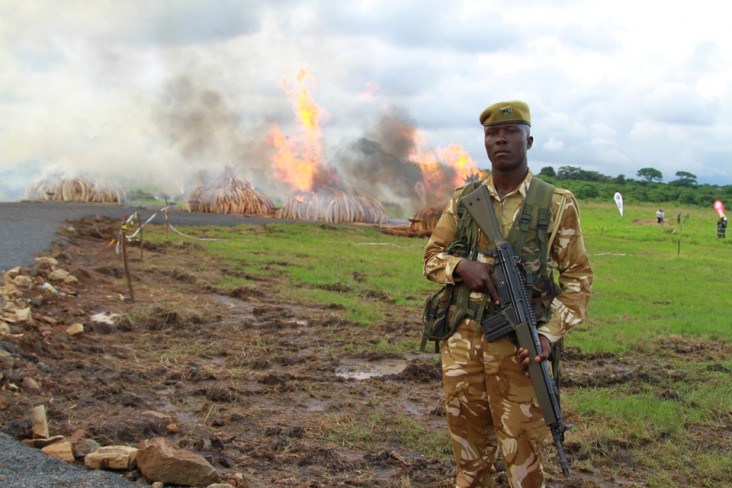
A record 105 tons of elephant tusks and 1.3 tons of rhino horn were set afire on April 30th at Nairobi National Park. The event, organized by the Kenya Wildlife Service (KWS), sent a strong symbolic message that Kenya's natural heritage is not for sale, and that wildlife alive is worth far more to the country's economic development and future generations than the money derived by their slaughter.
Eleven pyres of elephant tusks and rhino horns were set on fire, burning throughout the day. Described by many who attended as bittersweet, the event sparked calls to action from around the world. The KWS #worthmorealive online campaign, supported by USAID and the African Wildlife Foundation, ignited a global conversation to spread awareness of illegal wildlife trafficking and the critical need to combat wildlife crime. Hundreds of online videos, tweets and posts by conservation NGOs, businesses, and celebrities like actress Lupita Nyong’o echoed the urgency of protecting Africa’s remaining elephant and rhino populations and the landscapes they depend on.
The day before the event, Kenyan President Uhuru Kenyatta and Space for Giants, a Kenyan-based NGO, hosted the Giants Club Summit. At this historic gathering, heads of state from Botswana, Gabon, Kenya and Uganda committed to specific measures to protect and manage their elephant populations. The summit, supported by USAID, other development partners and businesses, “was the first time African heads of state met on African soil with the express purpose of saving the continent’s elephants.”
Days after the ivory burning, USAID and TRAFFIC, an international wildlife monitoring organization, released a report identifying Kenya as a key source and transit point for wildlife commodities exiting Africa. The report, developed in partnership with KWS and conservation experts, warned that weaknesses in wildlife trafficking policies, corruption, security lapses at border points and high demand in Asian markets are significant challenges to Kenya’s ability to quell a “renewed surge in poaching and trafficking of ivory and rhino horn.”
The United States is the largest bilateral donor to the conservation sector in Kenya, providing more than $50 million to support biodiversity and wildlife conservation. In 2015, these efforts helped KWS and community conservancies reduce elephant and rhino poaching by 46 percent in supported areas. Earlier this year, the American and Kenyan governments signed an agreement that will enable wildlife crime experts from the U.S. Department of Interior to work with East African governments to improve national and international networking and coordination and share best practices in halting wildlife crime. Planning and coordination for the first phase of this new partnership are ongoing. Subscribe to the Partnership to End Wildlife Trafficking newsletter for regular updates.







Comment
Make a general inquiry or suggest an improvement.